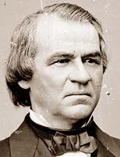 |
Andrew Johnson
b. 29 Dec 1808, Raleigh, North Carolina
d. 31 Jul 1875, near Elizabethton, Carter County, Tennessee |
| Title: |
President of the United States |
| Term: |
15 Apr 1865 - 4 Mar 1869 |
| Chronology: |
8 Feb 1865,
election to the office of Vice President of the United States is declared upon the ascertainment and counting of the electoral vote (cast 7 Dec 1864),
joint session of the Senate and the House of Representatives, House Chamber, U.S. Capitol, Washington, D.C. [1] |
|
4 Mar 1865,
commencement of term |
|
4 Mar 1865,
took the oath prescribed by law, regular session of the Senate, Senate Chamber, U.S. Capitol, Washington, D.C. [2] |
|
15 Apr 1865,
entered upon the duties of the office of the President of the United States upon the death of the incumbent [3] |
|
15 Apr 1865,
took the oath of office as the President of the United States, private ceremony, Kirkwood Hotel, Washington, D.C. [3] |
|
4 Mar 1869,
expiration of term |
| Biography: |
| Self-educated; at the age of 13 was apprenticed to a tailor; moved to Tennessee in 1826; employed as a tailor; alderman of Greeneville, Tennessee, 1828-1830; mayor of Greeneville 1834-1838; member, State house of representatives 1835-1837, 1839-1841; elected to the State senate in 1841; elected as a Democrat to the 28th and to the four succeeding Congresses (4 Mar 1843 - 4 Mar 1853); chairman, Committee on Public Expenditures (31st and 32nd Congresses); did not seek renomination, having become a gubernatorial candidate; Governor of the State of Tennessee (17 Oct 1853 - 3 Nov 1857); elected as a Democrat to the US Senate (8 Oct 1857 - 4 Mar 1862); chairman, Committee to Audit and Control the Contingent Expenses (36th Congress); was appointed Military Governor of Tennessee (12 Mar 1862 - 4 Mar 1865); elected Vice President of the United States on the National Union ticket (name adopted by the Republican National Convention in 1864) headed by Abraham Lincoln; prompted calls for his resignation among the Republicans after he appeared in a drunken state at his taking the oath of office on 4 Mar 1865; became President of the United States on 15 Apr 1865, upon the death of Lincoln; during his presidency seceded states were readmitted to the Union; impeded the implementation of the Reconstruction Acts, providing for Negro suffrage and military administration of the Southern states; wide differences arising between the President and the Congress, a resolution for his impeachment passed the House of Representatives on 24 Feb 1868; eleven articles were set out in the resolution and the trial before the Senate lasted three months, at the conclusion of which he was acquitted (26 May 1868) by a vote of 35 for conviction to 19 for acquittal; retired to his home in Tennessee upon the expiration of the presidential term; unsuccessful candidate for election to the U.S. Senate in 1869 and to the House of Representatives in 1872; elected as a Democrat to the U.S. Senate (4 Mar 1875 - 31 Jul 1875). |
| Biographical sources: Biographical Directory of the United States Congress (2005). |
| Elections: |
| Candidate |
Electoral vote (7 Dec 1864) |
| Andrew Johnson |
212 |
| George Hunt Pendleton |
21 |
| total number of electors appointed |
234 |
| number of votes for a majority * |
118 |
|
| * One elector did not vote (requirements for attaining a majority for election) |
| Source of electoral results: Senate Journal, 38th Congress, 2nd Session, 149-150; Congressional Globe, 38th Congress, 2nd Session, 669.
|
| |
| [1] |
Senate Journal, 38th Congress, 2nd Session, 148-150; Congressional Globe, 38th Congress, 2nd Session, 668-669. |
| [2] |
Senate Journal, 38th Congress, 2nd Session, 331, 340-342; Congressional Globe, 38th Congress, 2nd Session, 1389, 1394-1395. |
| [3] |
Sunday Morning Chronicle, Washington, April 16, 1865; "The Salmon P. Chase Papers", ed. by John Niven (Kent, Ohio: Kent State University Press, 1993), vol. 1, 529-531. |
|
Image: photograph (created between 1860 and 1865). |

